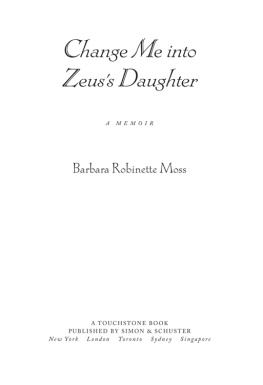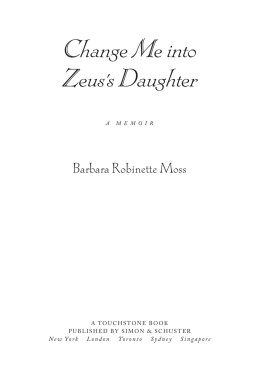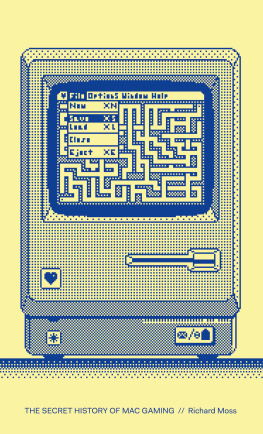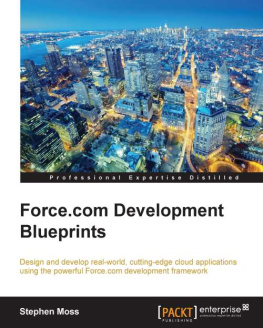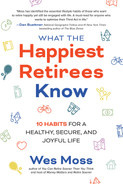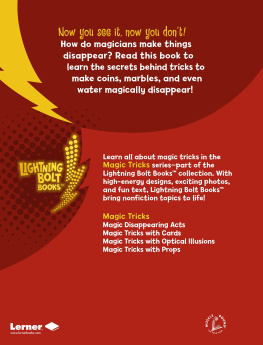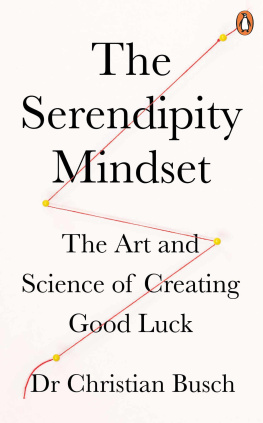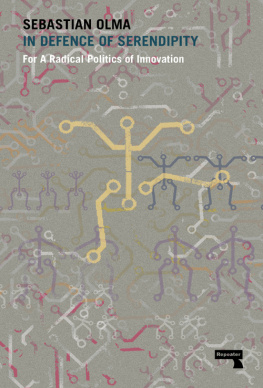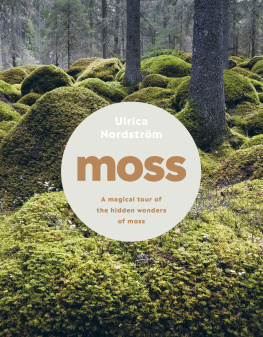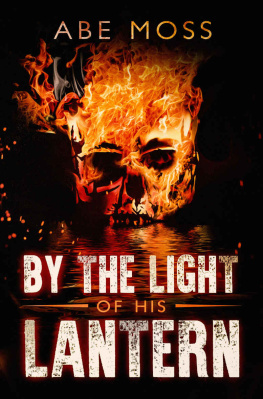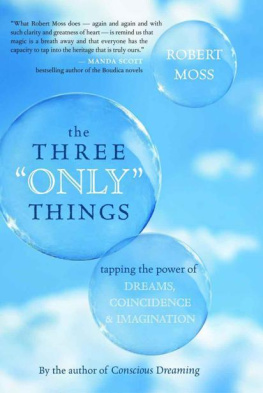Moss - The Sorcerersand Their Apprentices
Here you can read online Moss - The Sorcerersand Their Apprentices full text of the book (entire story) in english for free. Download pdf and epub, get meaning, cover and reviews about this ebook. year: 2011, publisher: Crown Publishing Group, genre: Politics. Description of the work, (preface) as well as reviews are available. Best literature library LitArk.com created for fans of good reading and offers a wide selection of genres:
Romance novel
Science fiction
Adventure
Detective
Science
History
Home and family
Prose
Art
Politics
Computer
Non-fiction
Religion
Business
Children
Humor
Choose a favorite category and find really read worthwhile books. Enjoy immersion in the world of imagination, feel the emotions of the characters or learn something new for yourself, make an fascinating discovery.

The Sorcerersand Their Apprentices: summary, description and annotation
We offer to read an annotation, description, summary or preface (depends on what the author of the book "The Sorcerersand Their Apprentices" wrote himself). If you haven't found the necessary information about the book — write in the comments, we will try to find it.
Moss: author's other books
Who wrote The Sorcerersand Their Apprentices? Find out the surname, the name of the author of the book and a list of all author's works by series.
The Sorcerersand Their Apprentices — read online for free the complete book (whole text) full work
Below is the text of the book, divided by pages. System saving the place of the last page read, allows you to conveniently read the book "The Sorcerersand Their Apprentices" online for free, without having to search again every time where you left off. Put a bookmark, and you can go to the page where you finished reading at any time.
Font size:
Interval:
Bookmark:
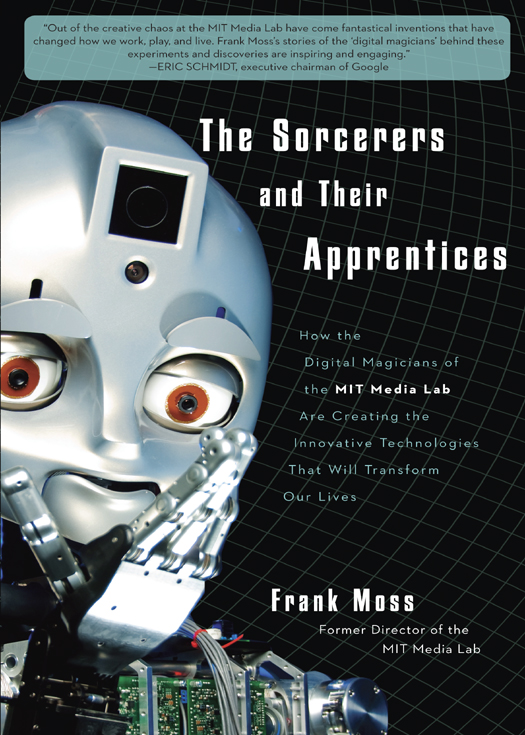
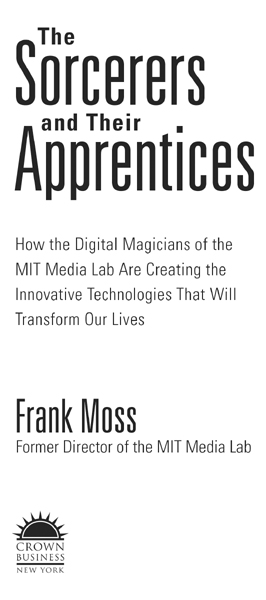
Copyright 2011 by Frank Moss
All rights reserved.
Published in the United States by Crown Business, an imprint of the Crown Publishing Group, a division of Random House, Inc., New York.
www.crownpublishing.com
CROWN BUSINESS is a trademark, and CROWN and the Rising Sun colophon are registered trademarks of Random House, Inc.
Library of Congress Cataloging-in-Publication Data
Moss, Frank, 1949
The sorcerers and their apprentices : how the digital magicians of the MIT Media Lab are creating the innovative technologies that will transform our lives / Frank Moss.
p. cm.
Summary: From the former director of the famed MIT Media Laboratory comes an exhilarating behind-the-scenes exploration of the research center where our nations foremost scientists are creating the innovative new technologies that will transform our future
Provided by publisher.
1. Massachusetts Institute of Technology. Media Laboratory. 2. Digital communicationsResearchUnited States. 3. ScientistsMassachusettsCambridgeIntellectual life21st century. I. Title.
TK5103.7.M675 2011 607.27444dc22
2010052742
eISBN: 978-0-307-58912-5
Jacket photograph by Sam Ogden
v3.1_r1
To Professor Seymour Papert,
whose passion for children and learning appended heart to mind and hand in the MIT motto
and who changed my entire perspective on the future of people and technology during a fifteen-minute chat on Cape Cod

We must humanize technology before it dehumanizes us.
Oliver Sacks, neurologist and author
In December of 2005 I was struggling with a decision. Should I accept an offer to become the MIT Media Labs next director? It looked to be a dream job for a career technologist and entrepreneur such as myself, and it fit well with my desire to contribute more directly to the challenges facing society. However, I was wondering if this move made any sense at all for me, given the well-known cultural differences between business and academia that I had heard so much about.
To get an insiders view, I called Professor Rodney Brooks, then director of MITs Computer Science and Artificial Intelligence Laboratory (CSAIL). Brooks is a distinguished academic in the field of robotics and also a successful entrepreneur, so I guessed he might relate to my dilemma. When I asked why he had made the decision to become director of CSAIL, he pondered the question for a moment and then declared, Besides the opportunity to work with the smartest people anywhere, the biggest advantage of being director of a major MIT lab is that if there is a story you want to tell, its a fantastic stage from which to tell it.
After I took the job, I thought about this often, and before long the story I wanted to tell became clear. Actually it was many stories. Perhaps its not so surprising that as I traveled around talking about the Media Lab, audiences were blown away by the latest inventions that I showcased. But what struck me was that they were equally impressed by the stories I told about how these inventions actually came into beinghow they grew out of an environment that totally defies the conventional wisdom of what a research lab should be. At the Media Lab, people from an astonishing variety of disciplines (architects, computer scientists, electrical engineers, musicians, neuroscientists, physicists, visual artists, just to name a few) enjoy the unrestricted freedom to create and invent as their passions dictate. They dont sit around and wait for inspiration to hit. Rather than thinking about what to build, they dive in and build what they are thinking about. This unfolds totally out in the open, in cluttered workshops where students rub shoulders regularly with liaisons from the worlds largest corporations. The only guidelines for the researchers are that (1) their inventions have the potential to significantly improve peoples lives in the future and (2) their work is radically different from what anyone else is doing.
In this open and anything-goes environment, ideas germinate, cross-pollinate, and mutate in a fashion that is literally out of control. But thats the idea. Out this creative chaos emerge literally hundreds of inventions a year, from the practical to the lunatic. It is not uncommon for one or more of them to survive and somehow grow into an innovation that disrupts industries, spawns entirely new ones, or even transforms society.
Inspired by the enthusiastic reception of my audiences, I have designed this book as a collection of stories about the faculty and student inventors at the Media Lab (the sorcerers and their apprentices), providing a behind-the-scenes look into the fascinating process (the magic) by which they create and invent. The stories that I have elected to tell, roughly two dozen in all, cover only a fraction of the inventions that are generated at the Media Lab every year. However, these are ones that I find to be particularly representative of both the Media Labs highly unorthodox approach to invention and innovation as well as the exciting new directions that its research is taking today.
Im not the first to write a book about the inventors and their inventions at the MIT Media Lab. Shortly after it officially opened its doors in 1985, the futurist Stewart Brand introduced it to the world in his 1987 volume The Media Lab: Inventing the Future at MIT. In it, Brand, who had spent some time in residence at the fledgling Media Lab, described the efforts of the early team, most of who didnt fit into the traditional academic silos of MIT but thrived in the eclectic, highly unorthodox environment of the Media Lab. This included cofounder and first director Nicholas Negroponte, who famously predicted the digital convergence of three industriesprint/publishing, broadcast/entertainment, and computersas well as the seismic shifts that this convergence would have on people, industries, and society. Negroponte later elaborated on these in his own 1995 book Being Digital.
While I was in the process of completing this book, the Media Lab celebrated its twenty-fifth anniversary. By this time, in fall of 2010, the digital convergence that Negroponte predicted had indeed occurred. Todays social, mobile, aware, real-time, and hyperconnected world of people and information, which the Media Lab helped to catalyze, has changed how we live, work, and play to a degree perhaps even greater than Negroponte or his cofounders could have possibly imagined.
But as amazing as these technologies seem to us, they are mere digital affordances compared to what is being imagined and invented at the Media Lab today. In addition to tapping into the full power of information and communication technologies, researchers at the Lab are also leveraging equally dramatic advances in the biological, physical, and social sciences, enabling them to create a new generation of inventions that will have a much deeper impact on peoples lives. Heeding Oliver Sackss urgent entreaty to humanize technology, the Media Labs mission for the next quarter century is to empower ordinary people to do truly extraordinary things and, in the process, take control over the most important aspects of their livestheir health, their wealth, and their happiness
Font size:
Interval:
Bookmark:
Similar books «The Sorcerersand Their Apprentices»
Look at similar books to The Sorcerersand Their Apprentices. We have selected literature similar in name and meaning in the hope of providing readers with more options to find new, interesting, not yet read works.
Discussion, reviews of the book The Sorcerersand Their Apprentices and just readers' own opinions. Leave your comments, write what you think about the work, its meaning or the main characters. Specify what exactly you liked and what you didn't like, and why you think so.

